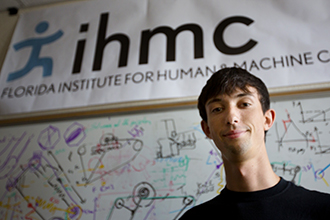Computer science makes a comeback

The fledgling coordinate computer science major offered by the Tulane School of Science and Engineering is helping students such as senior Brenan Keller prepare for future careers. (Photo by Jason Conrad)
Keller is well on his way to a successful career, largely due to the decision made by Tulane University to introduce the coordinate computer science major this academic year.
Tulane eliminated the computer science major as part of its Plan for Renewal after Hurricane Katrina. Ever since, Nick Altiero, dean of the School of Science and Engineering, has been determined to bring it back. He added a few classes in 2011, followed by the coordinate major this year.
“The coordinate major idea came out of a task force that I established to advise on how best to return computer science to the curriculum,” Altiero says. “In addition, we envision a bachelor's program in computer science at some point, but our priority is to get a doctoral program started.”
The coordinate major requires students to major in another discipline and take five introductory courses and three upper level courses. Students must complete a final project, and they are encouraged to find internships.
Two summers ago, Keller worked at the Florida Institute for Human and Machine Cognition, where he helped develop a remote ground vehicle interface. He also manages a local company's web department and is a partner in a startup company.
“My internship was a great learning experience, giving me insight into how research institutes operate and how research develops,” Keller says.
